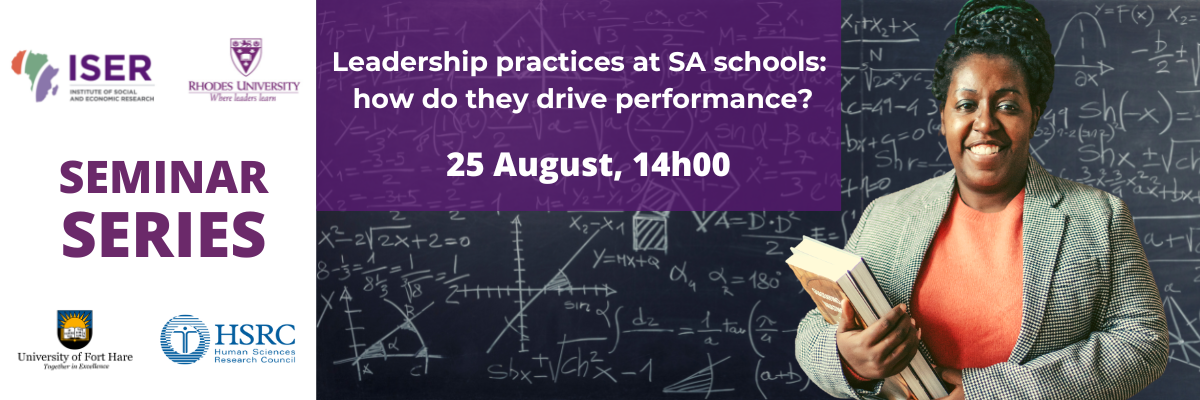
INSTITUTE OF SOCIAL AND ECONOMIC RESEARCH (ISER) AT RHODES UNIVERSITY - SEMINAR SERIES
Leadership practices at SA schools: how do they drive performance?
Quality school leadership and management is an important determinant of quality teaching and learning, especially in low-resourced schools.
South Africa has continued to see improvements in mathematics scores in the Trends in International Mathematics and Science Study (TIMSS), with the strongest gains between 2015 and 2019 observed among the most disadvantaged students. To sustain these improvements, it is crucial to understand why this upward trajectory in learning outcomes has occurred.
A new study by Dr Dumisani Hompashe investigates the improvement between 2015 and 2019 Grade 9 mathematics scores in South Africa, exploring the extent to which the difference in performance can be related to specific instructional leadership practices within schools. The study provides a holistic and policy-focused South African perspective on the relationship between instructional leadership and educational outcomes.
Please join us for a seminar on research that discusses two essential questions in order to guide policy:
- What is the association between instructional leadership and student learning outcomes in South Africa, across differently resourced schools?
- How is the increase in South African Grade 9 mathematics students’ learning outcomes from TIMSS 2015 to 2019 associated with changes in instructional leadership?
DATE: 25 AUGUST 2022
TIME: 14h00
Please note that this will be a HYBRID seminar,
conducted both in person in the ISER Seminar Room and online.
REGISTER TO PARTICIPATE ONLINE HERE
RSVP TO PARTICIPATE IN PERSON (only 10 spaces): b.mothlabane@ru.ac.za
VENUE: ISER Seminar Room, 6 Prince Alfred Street, Makhanda
CHAIR:
Dr Reesha Kara - Researcher, Institute of Social and Economic Research (ISER) at Rhodes University
SPEAKER:
Dr Dumisani Hompashe - Research Associate at the ISER, Rhodes University
RESPONDENT:
Dr Rethabile Mawela - Alan Macintosh Research Fellow - Institute for the Study of the Englishes in Africa (ISEA), Rhodes University
SPEAKER PROFILES
A senior lecturer at the University of Fort Hare, Dr Dumisani Hompashe also serves as Research Associate at the Research for Socio-Economic Policy (ReSEP) and the Institute of Social and Economic Research in Stellenbosch University and Rhodes University respectively. His research interests include the quality of education and healthcare, inequality of education outcomes, and development economics. Initially qualifying as a secondary school teacher, Dumisani has since gained a BA in Economics and English (UNISA); BA (Hons) in Financial Economics and an MCom in Financial Markets (Rhodes University)and PhD (Economics) from Stellenbosch University.
Dr Rethabile Mawela holds a PhD in Education: English Language Teaching and she is the Alan Macintosh Research Fellow in the Institute for the Study of the Englishes in Africa (ISEA) at Rhodes University. She teaches B.ED English Language Teaching (in-service), B.ED honors and supervises MED candidates. Transforming seasoned teachers into effective and efficient teachers of English is the foundation of everything she does professionally. Her research interests centre around the pedagogy of reading as well as reading for pleasure in disadvantaged communities.
Dr Reesha Kara is currently a researcher at the ISER focusing on human and economic development. Her research interests include fertility, youth development, single motherhood, socioeconomic wellbeing, poverty and social issues concerning South Africans. Specifically, she has years of experience and training in quantitative research methodology, focusing on the analysis of nationally representative survey data. Many of her research projects have been developed around the use of social statistics to understand social and economic phenomenon. Reesha has a Doctoral Degree in Social Policy and Labour Studies from the Neil Aggett Labour Studies Unit (NALSU), Rhodes University.
